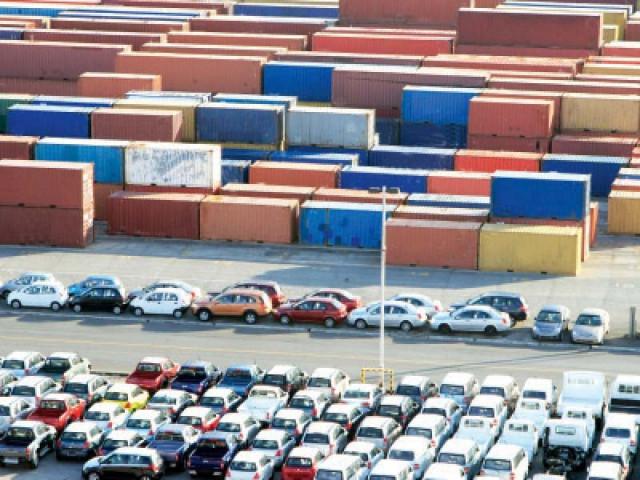Release of vehicles at port approved
Cabinet body also defers purchase of 150 tablets for federal cabinet members

A cabinet body on Friday deferred a proposal to purchase 150 computers for the federal cabinet members in relaxation of the rules while also modifying an earlier decision about the release of around 700 vehicles stuck at ports in a bid to charge higher taxes.
The Ministry of Information Technology, in a proposal to the Economic Coordination Committee (ECC) of the Cabinet, sought permission to purchase 150 new tablets for federal cabinet members by relaxing an austerity ban and also waiving public procurement rules.
In light of the recent massive cyber security breach, the Ministry of Information Technology proposed setting up a committee, and having representation of the National Telecommunication and Information Technology Security Board (NTIT) to ensure security of the said devices.
ECC Chairman, Finance Minister Ishaq Dar instructed the IT ministry to first share details regarding the cost of these devices and bring a proposal in writing to set up the committee.Recently, the unprecedented cyber security breach of the Prime Minister’s Office led to many questioning the capabilities of Pakistan’s intelligence agencies and asking for a review of the policy allowing the use of these tablets in sensitive cabinet meetings that are prone to be hacked.
The ECC also modified an earlier decision, made by the Miftah Ismail-led ECC, about the release of around 700 vehicles stuck at ports. Earlier, the ECC had waived the recently imposed taxes of up to 128% and allowed importers to get their vehicles cleared by paying surcharges. But when the matter was presented before the federal cabinet for its endorsement on Wednesday, the federal cabinet authorised Dar to review the ECC’s previous decision and come up with a proposal.
On Friday, it was proposed that consignments of the previously banned items, for which Goods Declarations have been filed on or after August 22, may be released at the rates of surcharge contained in the office memorandums or on the new enhanced rates of regulatory duties and additional customs duties, whichever is higher in terms of revenue implications.
The ECC approved the release of these vehicles on payments of either surcharge or additional duties, whichever are higher. The ECC also approved the summary for the Ministry of Commerce allowing the release of consignments of previously banned items for which Goods Declaration (GDs) had been filed on or after August 22, 2022, according to the official statement. The decision will also apply to other goods stuck that reached the country by August 22 and were earlier allowed to be cleared but got stuck at the ports.
While lifting the ban on August 19, the cabinet gave directives for releasing the goods lying at ports on the payment of surcharges and penalties based on the assessed value of the goods, in the range of 5% to 100%. The cabinet approved the imposition of a regulatory duty to discourage imports.
The ECC was informed that the new rates of regulatory duty, and additional customs duty, had become applicable with effect from August 22 and the Goods Declarations filed on and after August 22 were subject to the new duty rates.
The Ministry of Commerce stated that they were approached by some businesses complaining that they were not able to get their consignments cleared because new rates of regulatory duty and additional customs duty had been added to the WeBOC system. Besides surcharges, the new duty rates had also become applicable, hence they were facing a double penalty.
The ECC decided that these goods should be cleared either on the payment of surcharges or the duties. An official of the Federal Board of Revenue (FBR) said that around 700 vehicles of various engine capacities were stuck at ports that could now be cleared. Clearance of the vehicles will give FBR revenue of over Rs2 billion.
Last month, the cabinet allowed the release of held-up consignments of vehicles, mobile phones, and home appliances on payment of a 100% penalty. After that, the government targeted 49 tariff lines of vehicles with 10% to 100% regulatory duty and 7% to 28% additional customs duty. These duties had been waived on imports till August 18.
New and old cars of up to 1,000cc, that were earlier exempt from the regulatory duty, have been targeted with 100% duty bringing the total import taxes to 150%. Vehicles that were earlier subject to 77% import taxes will now face taxes of 169% as the government has imposed 85% more regulatory duty and 7% additional customs duty.
More expensive cars, both sports and high-engine capacity, have not been heavily taxed. These categories of vehicles, however, were earlier subject to total duties of 197% at the import stage. Now, the government has imposed 28% additional customs duty and only 10% additional regulatory duty.
The ECC also approved increasing electricity prices for K-Electric consumers by 51 paisa per unit with a recovery period of three months with effect from October.
Published in The Express Tribune, October 1st, 2022.
Like Business on Facebook, follow @TribuneBiz on Twitter to stay informed and join in the conversation.


















COMMENTS
Comments are moderated and generally will be posted if they are on-topic and not abusive.
For more information, please see our Comments FAQ